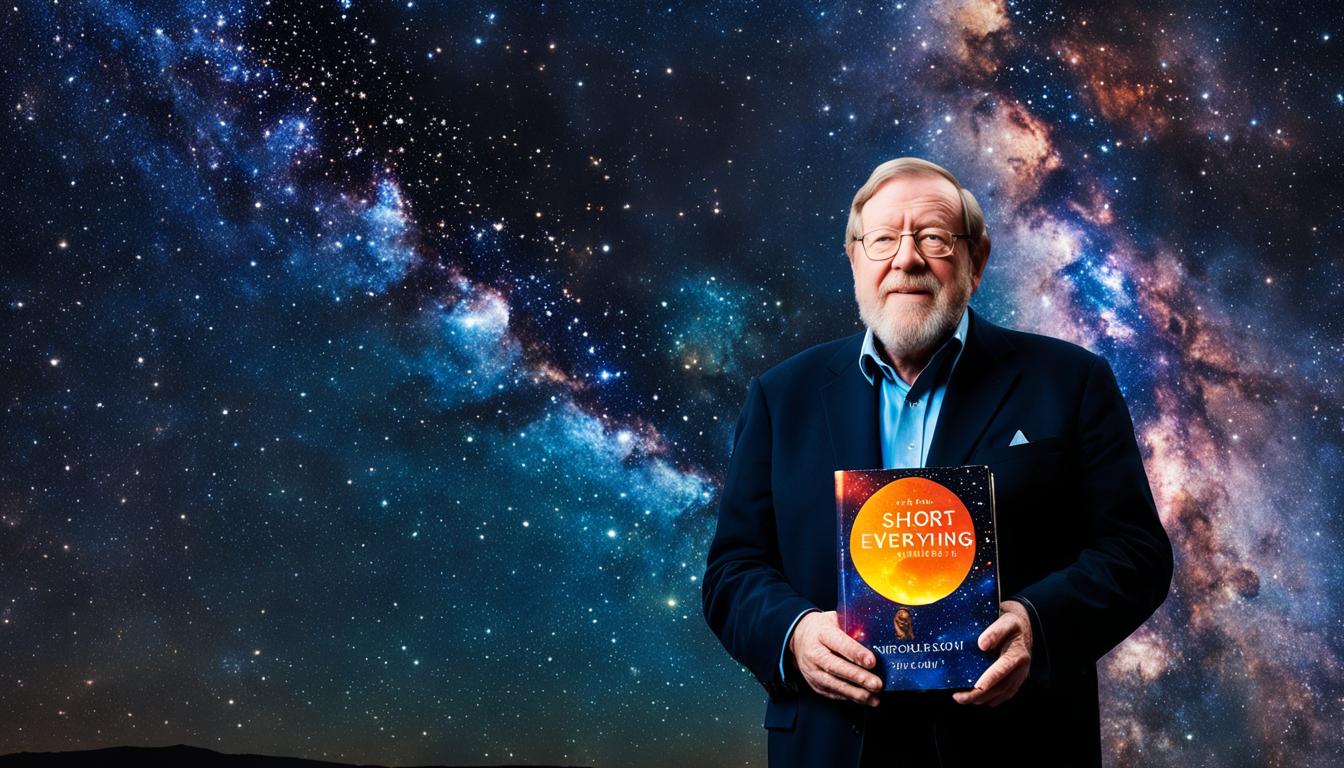Get ready for a journey through science like no other with the audiobook “A Short History of Nearly Everything” by the acclaimed author Bill Bryson. The perfect combination of engaging content and unique writing style, this audiobook offers an insightful and thought-provoking exploration of our world’s history.
Bill Bryson immerses us in a world of captivating stories and fascinating facts, unveiling the complexities of science in a way that’s both enjoyable and informative. In this audiobook review, we will take a comprehensive look at “A Short History of Nearly Everything,” examining its narration, content, scientific accuracy, impact, and critical acclaim. If you’re a science enthusiast or simply looking for a spellbinding audiobook to get lost in, “A Short History of Nearly Everything” is definitely worth a listen.
Key Takeaways
- “A Short History of Nearly Everything” by Bill Bryson is a captivating audiobook that explores the complexities of science in an enjoyable and informative way.
- The audiobook features engaging content and a unique writing style that simplifies complex scientific concepts, making them accessible to a wide audience.
- Bryson’s scientific accuracy and research ensure that the book is both informative and entertaining, without sacrificing accuracy or rigour.
- The audiobook has received critical acclaim, with many reviewers praising its impact and relevance in the realm of science literature.
- If you’re a science enthusiast or just looking for a captivating audiobook, “A Short History of Nearly Everything” is definitely worth a listen.
About the Author, Bill Bryson
Bill Bryson is a renowned and beloved author known for his witty humor and ability to bring complex subjects to life. Born in Des Moines, Iowa, in 1951, Bryson spent much of his early career as a journalist, writing for newspapers in the United States and the United Kingdom. He later turned to book writing, and his works encompass a diverse range of subjects, from travel and adventure to language and science.
Bryson has achieved much critical and commercial success throughout his career, with several of his books becoming bestsellers. He has a unique writing style that blends humor, accessible language, and extensive research, making his books enjoyable and informative for a broad audience.
Overview of “A Short History of Nearly Everything”
“A Short History of Nearly Everything” by Bill Bryson is a fascinating exploration of science that takes readers on a captivating journey through time. Split into six sections, the book presents a comprehensive understanding of scientific principles, theories, and discoveries that have shaped the world we know today. From the origins of the universe to the emergence of human life, Bryson weaves together stories of scientific discovery and personal anecdotes to convey complex ideas in an accessible and engaging manner.
Main Themes
The main themes of “A Short History of Nearly Everything” revolve around the history of science, from its inception to modern-day discoveries. The book explores scientific theories and ideas, challenging readers to question their own perceptions of the universe and their place in it. Through this examination, Bryson emphasizes the importance of scientific inquiry and the fundamental role it plays in our lives.
Narrative Structure
The narrative structure of “A Short History of Nearly Everything” is a chronological timeline that begins at the birth of the universe and works its way forward to modern-day science. It is presented in a story-like fashion, weaving together personal anecdotes and scientific explanations to create a compelling and cohesive narrative that keeps readers engaged throughout the book.
Key Topics
The key topics tackled in “A Short History of Nearly Everything” are diverse and wide-ranging, covering everything from the origins of the universe to the emergence of life on Earth. The book presents complex scientific information in a way that is easy to understand, making it accessible to readers of varying backgrounds and interests. Key topics explored in the book include cosmology, geology, paleontology, chemistry, and biology, among many others.
Narration and Audiobook Production
One of the key elements that determine the success of an audiobook is its narration and production quality. In “A Short History of Nearly Everything,” the narration is performed by the author, Bill Bryson, himself. Bryson’s voice is clear and authoritative, with a well-modulated tone that keeps the listener engaged throughout the audiobook.
The audiobook production value, on the other hand, is also impressive. The audio quality is excellent, with no background noise or distractions. In addition, the audio is properly mastered to ensure consistent volume levels and clarity.
This attention to detail in audiobook production enhances the listening experience, allowing the listener to focus on the content and absorb the information presented. Overall, the narration and audiobook production are executed flawlessly, making “A Short History of Nearly Everything” an enjoyable and engaging audiobook for all science enthusiasts.
Engaging Content and Writing Style
Bill Bryson’s “A Short History of Nearly Everything” features a writing style that is both engaging and thought-provoking. Bryson’s ability to simplify complex scientific ideas into an accessible language is a testament to his skill as a writer. His engaging content makes the audiobook an enjoyable listen for anyone interested in science or curious about the world around them.
One of the most remarkable aspects of Bryson’s writing style is his ability to tell a story that is both engaging and informative. He masterfully weaves together the history of science with vivid descriptions of the natural world to create an immersive experience for the reader. Even the most complex ideas are presented in a way that is easy to understand, making science accessible to a wide audience.
Furthermore, Bryson’s use of humor and wit throughout the audiobook breaks up potentially dry subject matter and creates a more light-hearted atmosphere. The listener can enjoy learning about science without feeling overwhelmed or bored.
The audiobook’s engaging content and writing style are further accentuated by Bryson’s excellent voice performance. His tone and inflection add depth and personality to the audiobook, elevating it from a mere recitation of facts to a fully immersive experience.

Example Table
| Aspect | Description |
|---|---|
| Clear and concise language | Bryson simplifies complex scientific ideas into an accessible language |
| Engaging storytelling | Bryson’s ability to tell an engaging story that is both informative and enjoyable |
| Humor and wit | Bryson’s use of humor and wit breaks up dry subject matter and creates a more light-hearted atmosphere |
| Excellent voice performance | Bryson’s tone and inflection add depth and personality to the audiobook |
Scientific Accuracy and Research
Bryson’s “A Short History of Nearly Everything” is a meticulously researched work that takes into account the latest scientific discoveries and theories. The content is backed by credible sources and presented with scientific accuracy, allowing readers to gain a deeper understanding of complex scientific concepts.
Bryson’s attention to detail and commitment to scientific accuracy is evident in the extensive research he conducted for this work. He consulted with leading experts in various scientific fields to ensure that the information presented in the book was up-to-date and credible. As a result, readers can trust the content presented in this audiobook to be scientifically accurate and supported by rigorous research.
One particular aspect that stands out in terms of scientific accuracy is Bryson’s ability to communicate the intricate details of scientific concepts in a way that is understandable to the layman. Through his unique storytelling style, Bryson is able to convey complex ideas in an entertaining and engaging manner without sacrificing scientific accuracy. This is a testament to his immense talent as a writer and his deep understanding of scientific principles and theories.
Overall, “A Short History of Nearly Everything” serves as a shining example of how to present scientific research and information in an accessible, engaging, and scientifically accurate manner. It is a must-read for anyone interested in the history of science and the mysteries of the universe.
Impact and Relevance
Bill Bryson’s “A Short History of Nearly Everything” has had a considerable impact in the realm of science literature since its publication. The audiobook has not only educated and inspired many readers in their scientific endeavors but has also become a popular choice among literature enthusiasts.
The engaging storytelling and accessible presentation of complex scientific concepts have made it a staple in science literature. Bryson’s work has contributed to popularizing scientific knowledge by breaking down complex topics into simple explanations, making the content approachable to a wider audience.
Moreover, “A Short History of Nearly Everything” has become increasingly relevant in today’s society, where science and scientific discoveries have become more crucial than ever. Bryson’s work ensures that readers can keep up with the world’s latest scientific findings and developments.
Reception and Critical Acclaim
Since its release, “A Short History of Nearly Everything” audiobook has garnered widespread critical acclaim and positive reception from audiences. Critics have praised Bryson’s ability to explore complex scientific theories in a thoughtful and accessible way, making it enjoyable even for those without a background in science.
According to The Guardian, the audiobook “is a triumph of popular science writing” that “takes complex scientific theories and makes them not only comprehensible but also fun and engaging.” The New York Times calls it a “fascinating and intensely readable book,” while Publishers Weekly states that it is “an utterly captivating, consistently surprising tour de force of the subject of science.”
Bryson’s audiobook has won several awards, including the Aventis Prize for Best Science Book in 2004, the Descartes Prize in 2005, and the European Union Prize for Science Communication in 2005. It has also been translated into over thirty languages, further cementing its impact and reach across a global audience.
The overwhelmingly positive reception and critical acclaim for “A Short History of Nearly Everything” audiobook make it a must-listen for anyone seeking to expand their knowledge of science while enjoying an engaging and thought-provoking listening experience.
Conclusion
In conclusion, “A Short History of Nearly Everything” by Bill Bryson offers a captivating and thought-provoking journey through science that will leave listeners feeling inspired and knowledgeable. The audiobook review highlighted the engaging content and unique writing style of Bryson, which simplifies complex scientific ideas and makes them accessible to a wide audience.
The scientific accuracy and research presented in the audiobook add authenticity to its narrative structure. This audiobook is a must-listen for anyone interested in science and the mysteries of the universe.
The impact of “A Short History of Nearly Everything” has been significant in the realm of science literature, contributing to popularizing scientific knowledge through its engaging storytelling.
The reception and critical acclaim of the audiobook further solidify its status as a must-listen for those seeking knowledge and inspiration.
Overall, this audiobook review of “A Short History of Nearly Everything” by Bill Bryson has demonstrated why it is a standout in its genre and highly recommended for anyone interested in exploring the wonders of science.



